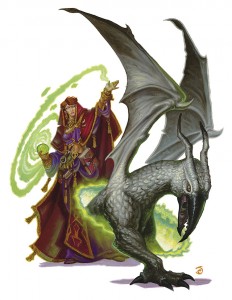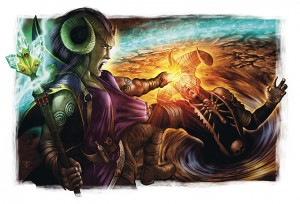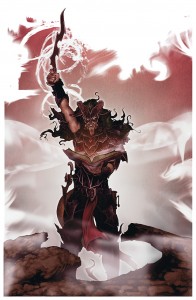 Generally when a character uses a summoning or banishing power there is no real though about how the power works. A creature is either summoned from a distant plane of existence to do your bidding or a dangerous foe is removed from combat for a short period of time. However, since most powers that summon or banish are arcane or psionic in nature, there is certainly room for customization that can make for some very interesting role-playing.
Generally when a character uses a summoning or banishing power there is no real though about how the power works. A creature is either summoned from a distant plane of existence to do your bidding or a dangerous foe is removed from combat for a short period of time. However, since most powers that summon or banish are arcane or psionic in nature, there is certainly room for customization that can make for some very interesting role-playing.
Without changing the mechanics of how summoning or banishing powers actually work, the players and DM still have a tremendous about of flexibility when it comes to describing how these powers function within the game itself. Think of it as flavour text, but don’t stop there.
Consider for a minute the consequences and repercussions of summoning a creature to fight your battles or to banishing an incredibly deadly foe to some distant plane, even if it’s only for a very brief time period. A little imagination can add a lot of flavour to your game the next time a character uses one of these powers.
Summoning
There are almost 100 powers with the summoning keyword. The Summoner Wizard, Shaper Psion and Hexblade Warlock classes all rely heavily on summoning powers.
In a 3.5e game I played many years ago, one of the players was running a Druid for the first time. He was constantly summoning creatures to fight for him. During one game he asked this seemingly innocent question: “Do you think that every time I use this spell to summon the same kind of creature that I summon the exact same creature?” The DM at the time said no and we didn’t think much more about it. But it is something that I’ve thought of on many occasions since then.
Thinking back to previous editions of D&D there were spells that allowed you to summon a powerful creature to do your bidding. In these cases you had to actively negotiate the terms of service with the creature before it agreed to help you. I understand that this is not usually the case when creatures are summoned. For lower level powers you just summoned the creature and the magic compelled it to do whatever it was you wanted it to do (usually attack your enemies).
However, the spells did mention that if you could communicate with the creature summoned you could give it commands more elaborate than just attack my enemies. You could get it to perform other nominal tasks.
We made great use of summoned creatures for non-fighting purposes. Often summoned creatures would fly us across caverns, lakes or over walls. We also used them to crash through doors. On rare occasions we even summoned creatures to run ahead of the party if we thought the corridor was trapped. Using summoned creatures in this way (essentially to send them to their death) was not something that the Druid or the DM let us do very often. We needed a really strong in-game reason to convince the Druid that the creature’s possible death was for the greater good.
In fact it was during one of the debates over “abusing” the summoned creature as nothing more than a pit-trap detector that the Druid asked his question. His thought was that if he summoned the same creature every time, it would be far less cooperative on a subsequent summoning if we didn’t treat it right.
Nothing we ever found in the rules stated a definitive answer either way, but for characters that summon the same kind of creatures all the time, how might things be different if the summoned creature was in fact he same individual every single time. How might the relationship between the summoner and the creature develop over time? As the DM I’d never have it interfere with the way the power worked, but it does create a fantastic opportunity for role-playing.
Banishment
 During our expedition into the Tomb of Horrors a few months ago one of the characters, a Bard, made great use of his level 5 daily power Timeless Trek in Mithrendain which banished the target to the Feywild. In order to make the power a little bit more interesting the player decided that whenever he used this power, the target always went to the exact same place in the Feywild.
During our expedition into the Tomb of Horrors a few months ago one of the characters, a Bard, made great use of his level 5 daily power Timeless Trek in Mithrendain which banished the target to the Feywild. In order to make the power a little bit more interesting the player decided that whenever he used this power, the target always went to the exact same place in the Feywild.
The running joke became that the location happened to be in the centre of a village full of peaceful, fun-loving Fey creature. Every so often, without warning, a dangerous (and usually very angry) creature would appear and wreak havoc. Before the bewildered Fey creatures knew what was going on, the target would make its save and reappear in the real world, leaving the confused Fey creatures to try and figure out what just happened.
The idea that a banishment power not only sent you to a far away place, but that it sent you to the exact same far away place every time got me thinking. This actually makes a lot of sense. I’m not suggesting that the banished creature should appear in the middle of an inhabited village (although we do still joke about it), but the idea that the power is linked to a specific location seems quite logical.
After all the character using the power probably isn’t that familiar with places in the Feywild, astral plane, plane of fire, or wherever else his power allows him to send the target. I imagine that the character was so excited and please with himself for getting it to work successfully the first time he’d be unlikely to make any changes to the way he invokes the power on subsequent attempts. So if nothing else changes during the casting (since it’s usually a spell) then why should the destination?
Once the player realizes that banished creatures always go to the same location perhaps they would make an effort to find that place and scout it out. Again, without changing the way the power works, there are still some pretty interesting things a creative player could do to add extra flavour to the power. The banished creature shouldn’t be subjected to any harmful effects when it reaches the destination, but that doesn’t mean it can’t still be messed with.
Maybe the character somehow located a secured location, like a prison, and when the banished create is sent away it appears inside an enclosed cell. Not only is it confused as to what happened and why it’s suddenly someplace different, but now it’s confined as well (or at least until it saves and returns to the battle).
For powers where the PCs is himself banished (or I supposed transposed is a more appropriate term for a voluntary banishment) he could appear in a lavish room full of nice things and lavish refinement. This is still nothing that has any mechanical benefit, but again just something to make for interesting role-playing.
When the Summoner Becomes the Summoned
 When players choose their character’s race they usually look at the abilities that receive a +2 bonus and the racial powers. One thing that is rarely given any great consideration is the creature’s origin. Players forget that Elves, Drow, Half-elves, Eladrins and Gnomes all have the Fey origin. So any spell that says it summons a Fey creature could, in essence, summon them.
When players choose their character’s race they usually look at the abilities that receive a +2 bonus and the racial powers. One thing that is rarely given any great consideration is the creature’s origin. Players forget that Elves, Drow, Half-elves, Eladrins and Gnomes all have the Fey origin. So any spell that says it summons a Fey creature could, in essence, summon them.
This is unlikely, I’ll give you that, but I see this making for an excellent adventure hook. Imagine an Elven character that just disappears. About a minute later he reappears with noticeable signs of injury and likely down a healing surge or two. He tells the rest of the party that he suddenly appeared in a heated battle and felt a compelling urge to help one side of the conflict. He fought as long as he could but eventually took so much damage that he collapsed. And it was at that moment when he reappeared here.
Astute players will quickly catch on to what’s just happened. Now taking into consideration all the things we talked about above, what if the Wizard that summoned our Elf friend decides to cast that spell again tomorrow? If he’s keyed to that one specific Fey creature then our companion can reasonably expect that he’ll be answering the summons, whether he wants to or not, the next time that Wizard uses that power.
Finding the Wizard and getting him to stop summoning the Elf in your party will likely become a high priority. The Wizard probably isn’t even aware that his power is causing you any inconvenience, just as you wouldn’t be aware of this detail when you used a summoning power. So the confrontation that will inevitably happen may not end up in bloodshed (although the Elf may refuse to see any other outcome after all of the indignities he’s suffered).
If I were to use this kind of hook in my game I’d rule that the damage sustained by the Fey creature during his summons didn’t actually affect his numbers in any way. What I would do is have fun with it. Every time the PC disappeared he’d eventually return with some wild tale of what happened. Usually it would be a tale of combat, but not every time. On occasion he’d be asked to taste food, pull a lever, open a door or run down a hallway ahead of the Wizard.
This kind of adventure could really open the eyes of any party that has abused summoning powers in the past. Turning the tables on a given situation and making the guy who was in the position of power suffer the hardships of those below him is a good way to teach him some humility. I’ll bet that any PC who is summoned in this way will be a lot less likely to use summoning magic in the future. And if they do you’d better believe that they’ll take steps to ensure the creature is treated fairly.
Have you had any memorable experiences with summoning or banishment magic at your gaming table? Have you had a character abuse their summoning powers in the kind of ways I described above? How did you handle it? Would you ever have a PC be the subject of another creature’s summoning? Do you think the players would find it amusing or be angry?
 Looking for instant updates? Subscribe to the Dungeon’s Master feed!
Looking for instant updates? Subscribe to the Dungeon’s Master feed!
5 replies on “Summoning and Banishment”
HAHAHAHA
Very good twist, definetly going to do it, but dunno the logical explanation of an elf or gnome be a Fey creature and be summon… Hum not sure, i would have to find a very good explanation for my players.
Probably what i would do is that while being part of a poweful summoning ritual something when wrong and when the ritual collapsed one or more of the players where hit by a ray that weakens their conection to the plane and for some period of time or until they find a way to fix it, they can become subject to summons.
Something I know will happend at my table is, if a player is summon to fight and he loots the fallen sword of a dead enemy? that loot belongs to the party that summon my player, i know my players will kill the summon if he was steeling their loot, but then he is going to be brought back when the summon ends, so i know some players will try to be creative and try to keep loot or something.. or maybe the party can summon him back and beat the crap out of him? hehehe that would being funny… for that i should decide if the summons are indeed the same creature.
I will like for comments to point the blank spots of this idea so it could be implemented because it sounds rather entretain to give the players the experience of being summon.
Will see… thanks for the post!
Nice one. Our last Campaign we were playing monsters and had a variation of the Monster Summoning spell (We’re still playing AD&D). The dungeon in which we lived had a “ready room” of Hobgoblins heavily armed for combat. A great comfort to the characters, when struggling with a human enemy, to have some special forces backup. However, their arrival was always followed up with verbal abuse as to our combat skill and that drinks were expected when we returned. It was a great twist enjoyed by players and DM.
I’ve actually seen something on the Wizards forums that this reminded me of. I’m fairly certain that I couldn’t find the link, but it boiled down to this.
The Create Planar Portal ritual can be extended indefinitely if the caster spends a healing surge per day for a year and a day. Assuming the party is willing to take that time off, the party wizard can cast this portal in a suitably dangerous place (above an underground lake, inside a pit trap, or the obvious Elemental Chaos), and take a year to make it permanent. Then, the wizard can cast the Planeshifter Paragon Path power Quick Portal to open up a portal to his personal deathtrap, the fighter can bullrush monsters in, and that utility power is now one of the most deadly powers in the game.
I think I have to disagree on the banishment– especially in the case of parallel planes, I think it makes more sense that the banished creature occupy the same space in the parallel world– so basically I’m saying if you banished something from the same location every time, it would go to a consistent banished location, but as you moved around and used the spell, the banished location would change as well. And who knows, maybe the location is also subject to the “arcane weather” of the universe, and is never completely reliable.
ZOMG, I LOVE the Summon the Summoner idea!!! In my home campaign, most of the characters are of Fey origin. I think they need to start taking turns getting teleported across the universe. 😀
[…] Summoning and Banishment […]